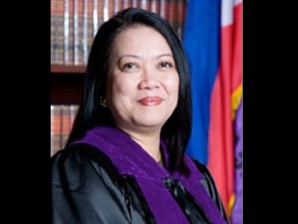Sereno likely to defy Supreme Court, says Palace
Palace officials on Tuesday said it was likely Associate Justice Lourdes Sereno would defy the Supreme Court and testify against Chief Justice Renato Corona, saying she has a firm sense of right and wrong.
A day after the Senate impeachment court rejected a prosecution motion to subpoena Sereno in a bid to avert a confrontation with the high tribunal, the House panel on Tuesday sent Sereno a formal invitation to appear in today’s trial.
“We understand the difficult position that you are in and we will strive to do our best to protect your right and dignity during the presentation,” Representative Neri Colmenares said in a letter to Sereno.
A member of Sereno’s staff, Zaldy Trespeses, said the justice had been on medical leave but was due back today. “She has given no indication if she’s going to attend or not,” he said.
“I trust and expect Justice Sereno to act as her conscience and understanding of the Constitution dictates,” Ronald Llamas, presidential adviser on political affairs, said in a text message to the Inquirer.
Article continues after this advertisementTruth, accountability
Article continues after this advertisement“I think it should be apparent from her written opinions that she is a person with a very firm personal sense of what is right and wrong,” Llamas said.
Budget Secretary Florencio Abad added in a text message to the Philippine Daily Inquirer: “Sereno can assert that, in the hierarchy of values, truth and accountability are supreme over institutional prerogatives.”
The prosecution wants Sereno to elaborate on her dissenting opinion on the court’s majority decision in issuing a temporary restraining order (TRO) on Nov. 15, 2011, against a government ban on travel abroad imposed on former President and now Pampanga Representative Gloria Macapagal-Arroyo. Sereno said that the TRO was evidence of Corona’s partiality toward Arroyo.
The prosecution’s invitation to Sereno coincided with a court order prohibiting two employees from testifying before the Senate tribunal. The employees were tasked to deliver the November 15 TRO.
Judicial privilege
“The court will be issuing a resolution expressing its sense that it is not waiving its judicial privilege on this matter,” said its spokesperson, Midas Marquez.
“The court issued a resolution on February 14 saying that the court has judicial privilege, especially in so far as pending cases are concerned,” he added.
Senators Francis Pangilinan and Franklin Drilon, stalwarts of the ruling Liberal Party, urged Senate President Juan Ponce Enrile to secure compliance of the two employees to the subpoena, which Enrile agreed to discuss in a caucus on Monday.
Drilon also moved to discuss in the caucus a defense motion to exclude illegally acquired bank evidence against Corona.
“Unless we assert the primacy and supremacy of the impeachment proceedings,” Pangilinan said, “the sole power to try and decide impeachment cases becomes fiction.”
Justice Secretary Leila De Lima has filed a motion in the Supreme Court to set aside its TRO, which she had ignored. She testified last week on Sereno’s dissenting opinion.
Enrile, the presiding officer, has ruled De Lima’s testimony was hearsay because she was not a member of the high tribunal, but nevertheless agreed to put her statement on the record.
The impeachment court ruled that the Sereno dissenting opinion was a matter of public record and was the best evidence on the issue.
Asked if he thought Sereno’s nonappearance in the impeachment court would be fatal to the prosecution case, Abad said, “No, not necessarily.”
“The dissenting opinion of Justice Sereno and Justice (Antonio) Carpio, including Sereno’s exposé of the irregular issuance and premature public declaration of the effectivity of the TRO are matters of judicial notice,” Abad said. “As evidence, they can be referred to.”
Context of anomalies
Abad said Sereno’s personal testimony “would have made these more emphatic and would have afforded the public more details about context and circumstances of these anomalous acts of the Supreme Court and the Chief Justice.”
“That would have dramatized vividly the connection between the Chief Justice’s illegal appointment and the Chief Justice-led majority’s frustrated attempt to enable Arroyo to escape prosecution via the TRO,” Abad said.
President Benigno Aquino III on Tuesday voiced hope that court employees would at least be allowed to testify.
“In the case of Supreme Court justices, I think they will be treated as a coequal and that has been the tradition and practice. A subpoena says you have power over somebody and if you are coequals, it would indeed be difficult to summon your coequal. You may invite,” the President told reporters.
“If what we’re trying to prove could be culled from others, who are not on a coequal basis, like the employees, I hope this could be allowed,” Mr. Aquino said.
Enough proof
Mr. Aquino declined comment when asked whether he hoped that Sereno, his first appointee to the Supreme Court, would testify against Corona.
“If she goes there, it could be said that I ordered her to go…. I don’t think there is a correct answer to that question. I hope you understand,” he said.
“I believe a good amount of evidence has already been presented,” the President said.
“Much has been proven when we talk about culpable violation of the Constitution or betrayal of public trust or even the issues about wealth,” he added.
“So any of the eight articles—any and all—any of them is at least enough to achieve the necessary objective.” With reports from Cynthia D. Balana and TJ Burgonio
